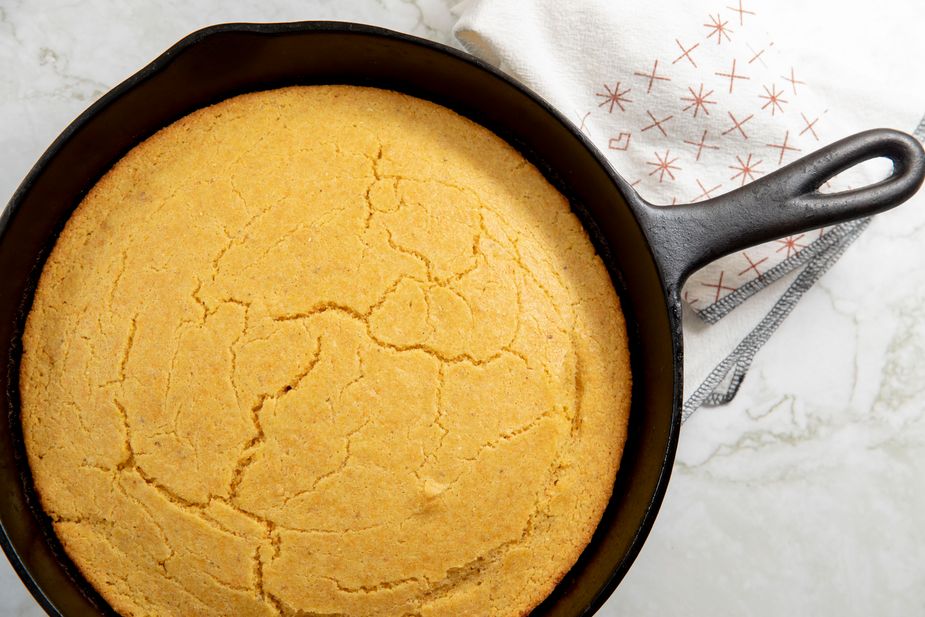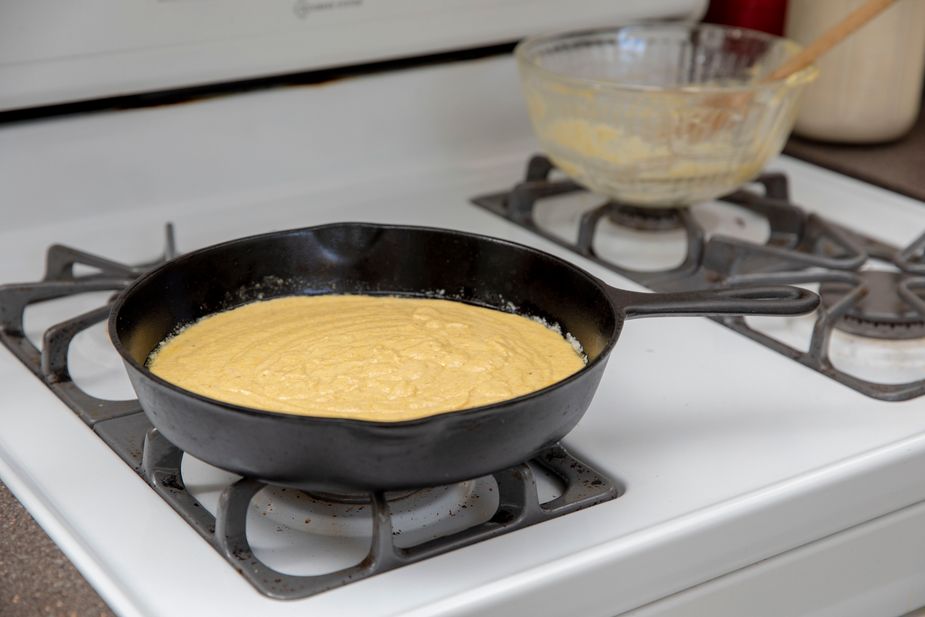The Cornbread Gospel
Published April 2020
By Kashea McCowan | 7 min read
Sunday dinners have always been a tradition for my family. We really go out on holidays, but no matter the occasion, the constant is good ole’ Southern home-cooked meals.
The menus change frequently, whether prepared on a Sunday after church or for holidays like Easter, except for one item. It doesn’t matter if we’re enjoying turkey on Thanksgiving, glutting on chicken dressing on Christmas, or chasing down painted eggs on Easter, cornbread is a must. It’s the cornerstone of Southern cuisine.

Cornbread in a cast iron skillet is a must for Kashea McCowan's family dinners. Photo by Lori Duckworth.
When I was growing up, every Sunday after church my dad, sister, and I would change out of our church clothes and wait for mama to prepare Sunday dinner. Supper, as my mama calls it, normally consisted of a portion of meat, one type of vegetable or bean—occasionally, we would have potato salad— and cornbread. Meatloaf, green beans, and cornbread; fried chicken, collard greens, and cornbread; pot roast, pinto beans, and—yep, you guessed it— cornbread. Everything mama cooked was made from the soul, nothing ever came from a can or box, and dinner almost always included cornbread.
We didn’t mind. It was one of our favorites and anyone who tried it loved it. Her soul was in every bite. Mama’s grace in the kitchen, paired with a good recipe, created those crispy, golden brown edges you can only get by using cookware like the timeless cast iron skillet. That’s what has kept my aunties and uncles stopping by the house every week for a slice.
Thousands of years before European explorers arrived in the New World, cornbread already was a popular food among Native American tribes. The south—with its hot, humid, and muggy weather—wasn’t such a great place to grow wheat like the rest of the country, but it was perfect for corn. That’s why it became a staple ingredient, from grits to even soap.
Cornbread didn’t start out as delicious as it is today. In the beginning, using just cornmeal and water, the bread was not particularly palatable. To make ends meet and weekly portions stretch, people like the slaves of the south had to come up with ways to enhance the leftovers and small rations they were given. A little bit of buttermilk, baking soda, oil, eggs, and baking powder made all the difference in the world when making more out of less. Sometimes slaves would also use pig fat to make bread.

Just waiting for the oven. Photo by Lori Duckworth.
After the Indian Removal Act of 1830, the Five Civilized Tribes, slaves, and black freedmen were made to move to Oklahoma—then still Indian Territory. Everything came with them, including their southern ways of eating. By the 1950s and ’60s, cornbread was a popular side dish, often classified as soul food. What we know—or rather, what our grandparents know—as hoecakes and dumplings were once called Indian fritters and Indian boiled cornbread. Among these dishes, hushpuppies, cornbread pudding, and grits also became popular in the south.
How popular and pervasive is cornbread in Oklahoma? Look no further than the Official State Meal, designated in 1988. Right there with the fried okra, barbecue pork, biscuits and sausage gravy, is cornbread.
Sharon McMillan, owner of Carican Flavors in Oklahoma City and a native of Trinidad, says that it wasn’t until she and her family moved to Oklahoma City that people began to request she make cornbread.
With everyone on lockdown because of the coronavirus, this year’s Easter dinner will be made by me. To prepare, I called my mom in Georgia so she could walk me through the cornbread-making steps, but what was supposed to be a simple written recipe became a Facetime yelling match between my mom, sister, and I. My mom still doesn’t get how this technology thing works.

Research Editor Kashea McCowan with her mother and sister Heather.
"Tell Shea that she will need to put oil in her skillet," mama says to my sister, Heather. "She will need about a cup and 1/4 of self-rising cornmeal, a half cup of vegetable oil, one egg, and some buttermilk. Tell her to stir it until it smooths out. And sometimes, I add just a tidbit of water just so it will smooth on out even more."
After speaking with my family, I meandered over to my kitchen and laid the ingredients. With nothing but time on my hands, social distancing allows me the chance to reminisce on my childhood. When my sister and I were small, we would play Michael Jackson's Moonwalker on Sega Genesis for hours while we waited for Sunday dinner. When it was time to eat, we would all gather in the kitchen, say our blessings, and sit at the table or kitchen counter together. I miss seeing my mother crumble her cornbread into her collard greens and eat them with her fingers, and I miss fighting with my sister over who gets the last piece of cornbread.
As thoughts and memories made their entrances and exits, I looked over into my cabinet and grabbed a couple of cans of pinto beans and a can opener. This cornbread deserves a proper meal.
"Tuesday Trivia: April 7, 2020"
"What I Learned in Oklahoma: The Essentials"
You May Like
Weekly Events Calendar: July 14-20, 2025
This week in Oklahoma: Fifty years of Eskimo Joe's in Stillwater; a Food Network star in Durant; and life's a peach in Porter and Stratfo...
This week in Oklahoma: Fifty years of Eskimo Joe's in Stillwater; a Food Network star in Durant; and life's a peach in Porter and Stratford.
Oklahoma Today Podcast: July 14, 2025
On this week's podcast we learn all about the Aquilops, a tiny little dinosaur discovered by researchers at Sam Noble Museum in Norman.
On this week's podcast we learn all about the Aquilops, a tiny little dinosaur discovered by researchers at Sam Noble Museum in Norman.
A Pink Paradise
Any book store is a good time, but this one's got a specialty soda bar.
Any book store is a good time, but this one's got a specialty soda bar.










